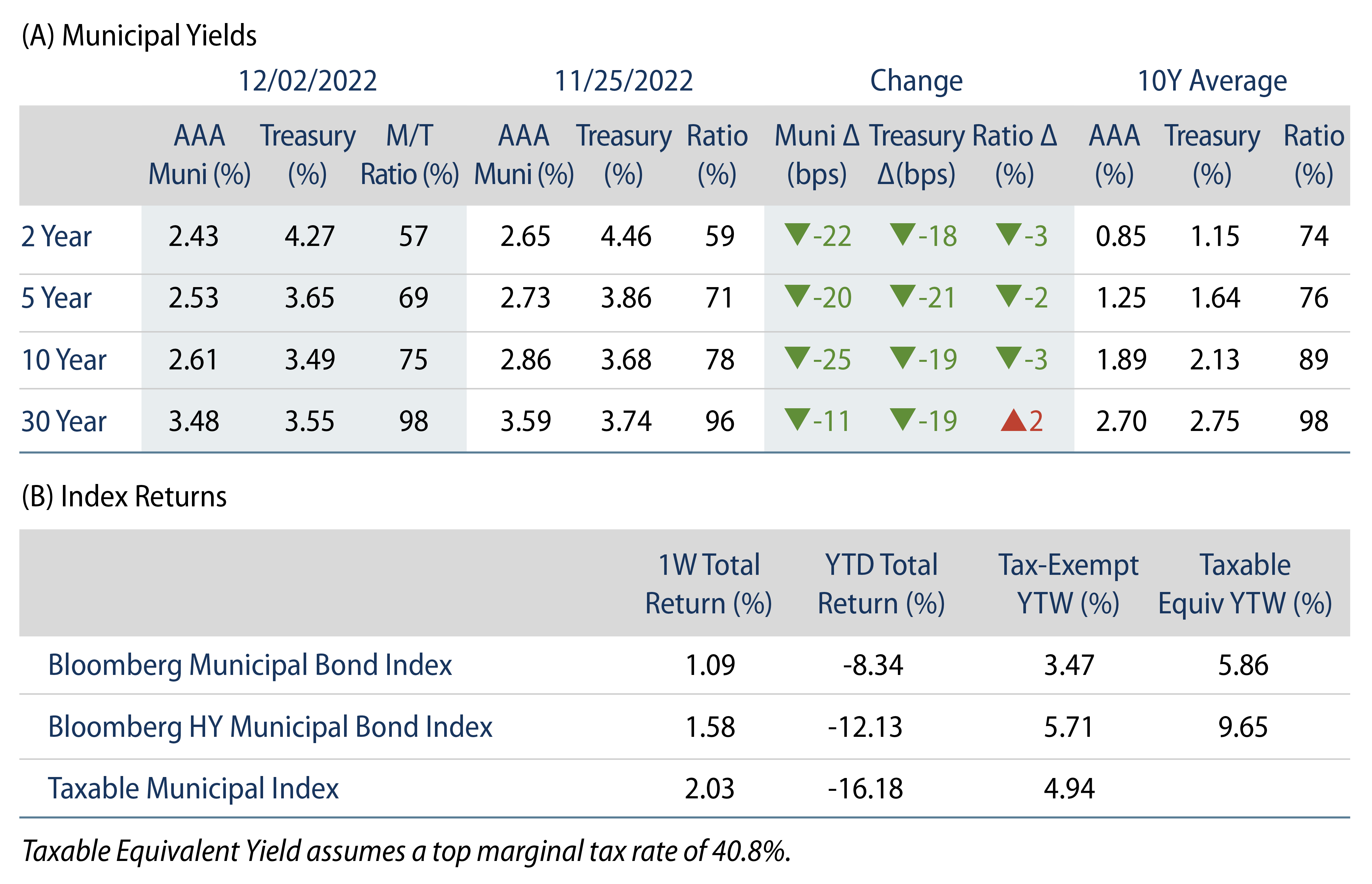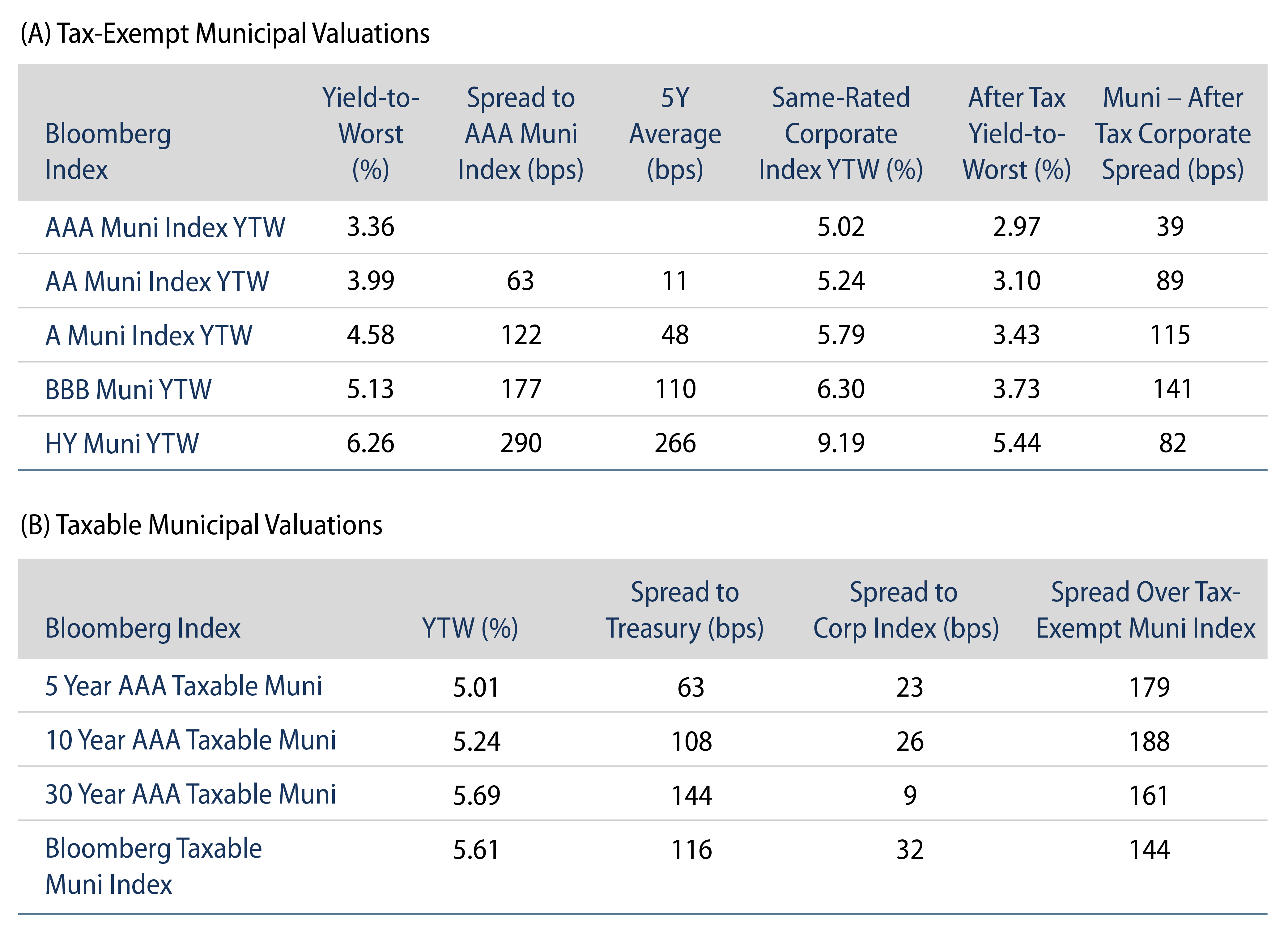Municipals Continued to Rally Last Week
Municipals continued to rally as they outperformed Treasuries in short and intermediate maturities. High-grade municipal yields moved 11-25 bps lower across the curve. Technicals remained challenged as municipal mutual funds reported outflows. The Bloomberg Municipal Index returned 1.09%, the HY Muni Index returned 1.58% and the Taxable Muni Index returned 2.03%. This week we highlight a rare General Obligation (GO) bankruptcy filing in the Commonwealth of Pennsylvania.
Municipal Mutual Fund Outflows Persist
Fund Flows: During the week ending November 30, Lipper weekly reporting municipal mutual funds recorded $1.4 billion of net outflows. Long-term funds recorded $1.1 billion of outflows, high-yield funds recorded $590 million of outflows and intermediate funds recorded $248 million of outflows. The week’s outflows bring year-to-date (YTD) net outflows to $112 billion.
Supply: The muni market recorded $8.6 billion of new-issue volume last week. Total YTD issuance of $348 billion is 18% lower than last year’s levels, with tax-exempt issuance trending 7% lower year-over-year (YoY) and taxable issuance trending 54% lower YoY. This week’s new-issue calendar is expected to decline to $6.5 billion of new-issue volume. Larger deals include $552 million Dekalb County Water and Sewer and $452 million California Community Choice Financing Authority transactions.
This Week in Munis: Chester, PA Filing Highlights Rare GO Bankruptcy
Last month, the City of Chester, Pennsylvania filed for Chapter 9 protection under the US Bankruptcy code, highlighting a rare municipal bankruptcy within the local GO sector. Chester had been weighed down by a population that declined more than 50% since its peak, high poverty rates, ongoing deficits and significant liabilities. The city’s debt burden included a $100 million unfunded pension obligation, which contributed to approximately $54 million of annual pension contributions that represented 88% of its budget. The city’s receiver filed for bankruptcy when an agreement with municipal workers to cut expenses could not be reached.
In Pennsylvania, the Commonwealth must approve any municipal bankruptcy filing, which typically follows a process for which the state declares the city a “distressed community” under the Financially Distressed Municipalities Act (Act 47). Under this program, state-appointed recovery teams develop detailed recovery plans that can remain in place for years, highlighting Pennsylvania’s reluctance to allow for local bankruptcies. Chester had been declared a distressed community in 1995. Investment in redevelopment, including a Harrah’s casino and racetrack and a major league soccer stadium, could not lift Chester’s fortunes, perhaps serving as a cautionary tale for other cities looking to similar projects for economic rejuvenation.
Chester is not the first municipality to come under stress in recent years. A combination of outmigration from rural to metropolitan regions, combined with elevated pension obligations, challenged the credit profile of many localities in the Commonwealth. Since 1993, 18 municipalities including Pittsburgh and Scranton have been designated distressed but have since recovered. A total of 14 other communities are currently under Act 47 supervision. Notably, Harrisburg (the state capital), attempted to file Chapter 9 in 2011, but had its case dismissed by the courts as a quickly enacted law requiring approval from the Commonwealth for a filing prevented the case from proceeding.
Although there are a number of Pennsylvania municipalities that are stressed, Western Asset does not anticipate significantly more filings given the Commonwealth’s historically successful remediation of troubled localities. Western Asset views Chester’s bankruptcy as an isolated situation not representative of broader market conditions, but a reminder of the value of active credit management within a municipal portfolio. Western Asset tends to favor revenue-backed debt over general obligation liens, and was not a holder of credit. In prior municipal bankruptcies, GO liens have generally proven to be senior yet unsecured, with restructuring outcomes providing GO debt lower recoveries versus pensioners and most dedicated revenue liens.





